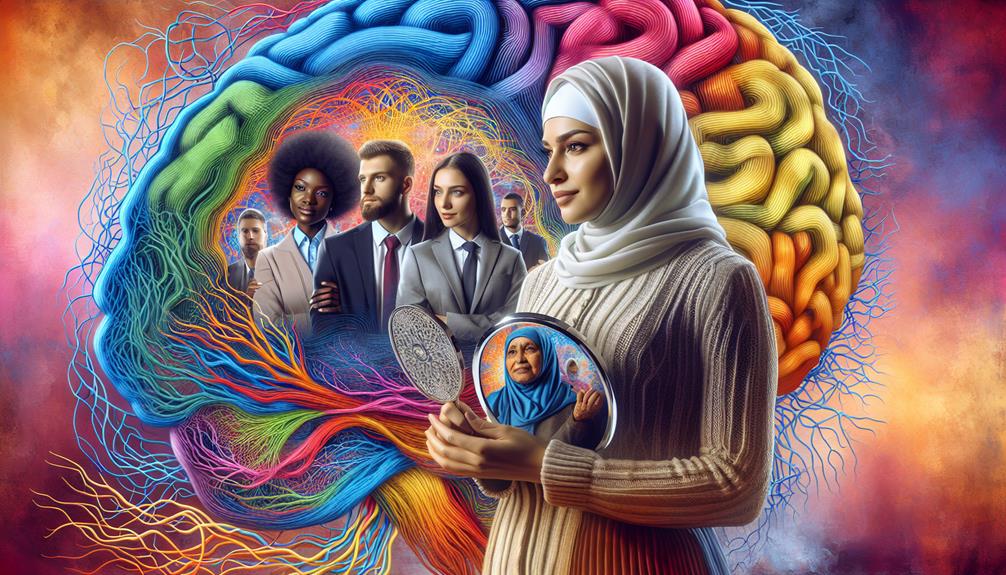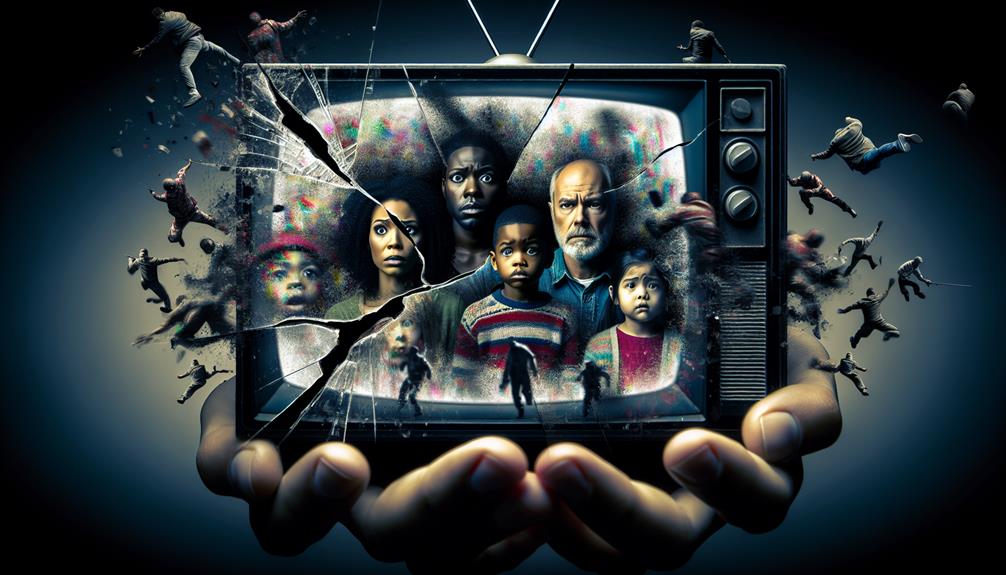You might not realize it, but every day you’re likely falling prey to confirmation bias, subtly steering your decisions and perceptions without your conscious awareness. As you navigate through a sea of information, your brain tends to latch onto details that confirm what you already believe, quietly sidelining anything contradictory. By understanding and acknowledging this inherent cognitive bias, you’re better equipped to challenge your own perceptions and grow. Curious about how this plays out in real scenarios and how you can effectively counteract it? Consider the implications for your personal and professional life as we explore strategies to recognize and overcome these biases.
Confirmation Bias
You’ve likely noticed how your pre-existing beliefs influence the information you accept or reject, a phenomenon known as confirmation bias. This bias affects your decision-making processes, often leading you to disregard evidence that contradicts your views.
Understanding and recognizing this bias in your daily life is important, as it also shapes your social beliefs and interactions.
Definition and Causes
Confirmation bias, a pervasive cognitive error, occurs when you subconsciously favor information that confirms your preexisting beliefs, disregarding evidence to the contrary.
This bias stems from the brain’s desire to efficiently process information and maintain cognitive consistency, leading to skewed perceptions and decision-making.
Studies show that this inclination not only influences personal beliefs but also affects professional judgments in fields like law, medicine, and science.
Subconscious Influence
Our brains often lead us to favor information that confirms our pre-existing beliefs, a phenomenon known as confirmation bias.
This subconscious influence shapes your perception, often without you realizing it. By filtering and prioritizing data that aligns with your views, your brain reinforces these beliefs, sometimes at the expense of contradictory evidence.
Understanding this bias is essential for challenging and expanding your perspectives.
Impact on Decision Making
Decision-making processes often suffer when individuals unconsciously seek information that confirms pre-existing beliefs, ignoring contrary evidence. This tendency, known as confirmation bias, can lead you to make flawed decisions because you’re not considering all relevant data. Studies in cognitive psychology have demonstrated that confirmation bias distorts your ability to weigh evidence objectively, increasing the risks of errors.
For instance, in the financial sector, investors might favor news that suggests a positive outlook on stocks they own, disregarding signs of potential market downturns. This selective acknowledgment can result in significant financial losses. Similarly, in healthcare, a doctor might diagnose based on their expectations influenced by confirmation bias, potentially overlooking alternative explanations that could be crucial for the patient’s health.
Understanding this, it’s important you actively challenge your initial thoughts and seek out disconfirming evidence. Analyzing situations from multiple perspectives enhances decision-making by reducing the sway of unchecked biases. This method isn’t just theoretical; it’s supported by research suggesting that critical thinking and exposure to a broad range of information can mitigate the effects of confirmation bias.
Therefore, fostering a habit of critical evaluation in your decision-making process is essential for more accurate and reliable outcomes.
Recognizing Confirmation Bias in Daily Life
You often encounter confirmation bias in your media consumption habits, perhaps without even realizing it.
For instance, if you primarily follow news outlets that align with your existing beliefs, you’re likely reinforcing your perspectives rather than challenging them.
This selective exposure limits your exposure to diverse viewpoints and critical analysis, potentially skewing your understanding of broader issues.
Examples in Media Consumption
In daily media consumption, individuals often unknowingly reinforce their pre-existing beliefs by selectively engaging with content that aligns with their views.
You’re likely to favor news sources that echo your opinions, ignoring others that could challenge your perspective.
This selective exposure perpetuates a cycle where only similar viewpoints are considered, limiting your understanding and promoting a skewed perception of reality.
Effects on Social Beliefs
Confirmation bias greatly influences social beliefs by reinforcing existing views and filtering out contradictory information. When you’re exposed only to data that confirms your pre-existing beliefs, you’re less likely to question or reassess your views, leading to a cycle of self-reinforcement that’s difficult to break.
Here’s how this impacts your social beliefs:
- Polarization: Social groups become more polarized as members continuously consume information that aligns with their group’s ideology. This lack of exposure to differing viewpoints reinforces a collective belief system, making compromise or understanding across different groups more challenging.
- Stereotyping: Confirmation bias can lead to or exacerbate stereotypes. If you’re only absorbing information that supports negative stereotypes, those ideas solidify, reducing your willingness to interact with or understand those groups.
- Resistance to Change: With a strong attachment to your beliefs, fueled by selective information, you’re less likely to adapt or change those beliefs even in the face of new, contradictory evidence.
- Social Media Echo Chambers: Online platforms often amplify confirmation bias by showing content that you’re likely to agree with, further entrenching your beliefs without challenge.
This cycle of confirmation bias in your social beliefs isn’t just self-limiting; it actively resists diverse perspectives, potentially fostering divisiveness and reducing societal cohesion.
Challenging Perceptions
As you explore ways to challenge your perceptions, consider the effectiveness of strategies like actively seeking diverse perspectives and engaging with case studies that illustrate successful mindset changes.
These approaches have shown substantial benefits in breaking down confirmation bias and fostering professional paradigm shifts, supported by research in cognitive psychology and organizational behavior.
Strategies for Overcoming Confirmation Bias
To counteract confirmation bias, you must cultivate open-mindedness and engage consistently in critical thinking. Research indicates that individuals who actively challenge their own beliefs and seek out diverse perspectives are less likely to fall prey to this cognitive bias.
Open-mindedness and Critical Thinking
Why is it essential for you to challenge your own perceptions and biases when aiming to enhance your critical thinking skills?
- *Expands Perspectives*: It broadens your understanding and opens up new ways of thinking.
- *Reduces Errors*: Minimizes the likelihood of making decisions based on flawed assumptions.
- *Improves Decision-Making*: Leads to more informed and effective choices.
- *Encourages Growth*: Stimulates personal and intellectual growth.
Seeking Diverse Perspectives
Exploring diverse perspectives can greatly broaden your understanding and challenge ingrained biases. By actively seeking out opinions that differ from your own, you’re not just gathering information; you’re critically engaging with the world in a way that tests your preconceived notions.
Research shows that exposure to a variety of viewpoints can have a profound impact on decision-making processes, leading to more balanced and thorough outcomes.
When you only interact with like-minded individuals, you’re likely to fall into an echo chamber, where the reinforcement of similar ideas occurs without any scrutiny. This can limit your cognitive growth and reinforce confirmation bias—a tendency to favor information that confirms your existing beliefs.
To counteract this, expanding your comfort zone and engaging with conflicting viewpoints is crucial.
Diverse perspectives don’t just challenge biases; they also enrich your knowledge base and enhance your problem-solving skills. Studies in cognitive psychology suggest that teams composed of individuals with diverse perspectives outperform homogenous groups, as they bring unique insights and approaches to the table.
Case Studies of Successful Mindset Changes
You’ve witnessed how deeply ingrained perceptions can limit personal and professional growth. Examining case studies where individuals successfully changed their mindsets reveals that critical self-reflection and exposure to diverse perspectives are key.
These stories not only inspire but also provide practical frameworks that you can apply to challenge your own biases.
Personal Growth Experiences
Often, individuals who successfully shift their mindsets reveal through their narratives the profound impact of embracing new perspectives. Here’s how you can do the same:
- Question existing beliefs regularly.
- Seek out diverse viewpoints actively.
- Reflect on the reasons behind resistance to change.
- Implement incremental changes to your thinking patterns.
These steps foster a more adaptable mindset, essential for personal growth and overcoming biases.
Professional Paradigm Shifts
In professional settings, challenging entrenched perceptions can catalyze significant paradigm shifts, enhancing innovation and problem-solving. You’ve likely observed scenarios where teams cling to old strategies despite evidence suggesting a need for change. It’s not just about introducing new ideas; it’s about dismantling the old belief systems that block them.
Studies reveal that organizations embracing diverse perspectives often outperform their peers. For instance, a 2019 McKinsey report found companies in the top quartile for ethnic and cultural diversity on executive teams were 33% more likely to have industry-leading profitability.
This isn’t merely about adding variety but about integrating these varied insights into a cohesive strategy that questions and overcomes outdated assumptions. You’ll notice that when you encourage questioning of the status quo, it fosters an environment ripe for innovation. Cognitive diversity—bringing together different ways of thinking—leads teams to uncover unique solutions that wouldn’t emerge otherwise.
You can apply this in your own workspace by promoting open dialogues where every team member feels valued for their input. This practice not only mitigates the risk of confirmation bias but actively leverages contrasting viewpoints to enhance decision-making and creativity. It’s a transformative approach that redefines problems and reimagines solutions, proving that challenging perceptions is vital for dynamic growth and success.
This Article Won’t Change Your Mind
You might find that your initial resistance to alternative viewpoints is rooted in a psychological phenomenon known as cognitive dissonance, where conflicting beliefs cause discomfort.
This discomfort often leads you to reject new information that contradicts your pre-existing beliefs, thereby reinforcing what you already think.
To truly grow and benefit, it’s essential to step out of your comfort zones, challenging your own perceptions and embracing the discomfort that comes with change.
Exploring the Resistance to Change
You often face psychological barriers when confronted with new ideas, as your brain’s inherent bias prefers familiar information.
Studies show that this cognitive dissonance isn’t just stubbornness; it’s rooted in the brain’s natural desire to conserve energy by sticking with known patterns.
Recognizing these barriers is vital in understanding why you might resist changing your views, even when presented with compelling evidence.
Psychological Barriers to Accepting New Ideas
Despite compelling evidence, many individuals’ deep-seated beliefs often shield them from embracing new ideas.
Key psychological barriers include:
- Cognitive Dissonance: The discomfort of holding conflicting beliefs.
- Confirmation Bias: Searching for, interpreting, and recalling information that confirms pre-existing beliefs.
- Groupthink: The pressure to conform to the opinions within one’s social circle.
- Status Quo Bias: The preference for things to stay the same, avoiding change.
Cognitive Dissonance in Decision Making
Cognitive dissonance often complicates decision-making processes, as individuals struggle to reconcile conflicting beliefs and actions. You’re frequently caught in a tug-of-war between what you’ve always believed and the evidence challenging these beliefs. This mental conflict isn’t just uncomfortable—it actively affects your decisions.
Research from cognitive psychology suggests that when faced with evidence that contradicts your pre-existing beliefs, you’re likely to experience discomfort, leading to two typical responses: rejection of new information or modification of your beliefs. For example, if you believe that a specific diet is beneficial but come across new studies that refute its effectiveness, you might dismiss this information to avoid the discomfort of changing your diet.
Furthermore, your decision-making process is influenced by the desire to maintain self-consistency. Studies have shown that people are more likely to make decisions that align with their self-image and previously held beliefs, rather than objectively evaluating new information. This bias can lead you to make less advantageous decisions.
Understanding this can empower you to recognize the role of cognitive dissonance in your decisions. By acknowledging this influence, you can consciously choose to contemplate conflicting information more openly, potentially leading to more informed and balanced decisions.
Embracing Discomfort for Growth
You often avoid uncomfortable situations, yet research shows that these experiences are pivotal for personal growth.
Studies indicate that when you confront challenges that push you out of your comfort zone, you greatly improve your problem-solving skills and emotional resilience.
Embracing discomfort, hence, isn’t just beneficial; it’s essential for your development.
Learning from Uncomfortable Situations
Why do we often avoid uncomfortable situations, even when they offer significant opportunities for personal growth?
Here’s what you gain from embracing discomfort:
- Enhanced Problem-Solving Skills: Facing challenges head-on improves your critical thinking.
- Increased Resilience: Each tough scenario builds your emotional endurance.
- Better Adaptability: Learning to cope in diverse situations enhances flexibility.
- Deeper Understanding: Interacting with differing viewpoints broadens your perspective.
Benefits of Stepping Out of Comfort Zones
Stepping out of your comfort zone, while often challenging, typically leads to significant personal growth and improved problem-solving skills. Research consistently shows that when you engage in new experiences, your brain is forced to adapt and create new neural pathways. This neurological activity doesn’t just enhance your cognitive flexibility; it also sharpens your ability to tackle unfamiliar problems more effectively.
Moreover, a study from the Journal of Psychological Science suggests that individuals who regularly push their boundaries are better at regulating their emotions and handling stress. This isn’t merely about gaining new skills or insights; it’s about fundamentally altering how you respond to challenges. By exposing yourself to diverse situations, you’re not just learning; you’re recalibrating your stress thresholds and increasing your resilience.
Embracing new challenges also correlates with higher levels of creativity. A paper published in the Creativity Research Journal found that people who seek out novel experiences tend to exhibit higher creativity scores. These experiences disrupt habitual thinking, fostering a mindset that’s more open to innovation and less bound by conventional constraints.
In essence, stepping outside your comfort zone isn’t just beneficial; it’s a critical component of lifelong learning and adaptability, enhancing both your personal and professional life.
Conclusion and Future Perspectives
As you reflect on the insights discussed, consider how recognizing and addressing your confirmation biases can reshape your personal development and enhance your relationships.
The evidence suggests that by understanding these biases, you’re better equipped to foster constructive dialogs and make more informed decisions, impacting not only your social interactions but also broader societal norms.
Looking ahead, integrating this awareness into everyday life could potentially transform societal dynamics by promoting a more empathetic and evidence-based approach to understanding differing viewpoints.
Summary of Key Insights
While exploring the dynamics of confirmation bias, it’s evident that challenging entrenched perceptions is essential for fostering critical thinking and informed decision-making. As you’ve navigated through various theories and evidence, several key insights have emerged that underscore the importance of addressing this cognitive bias in everyday life.
- Recognition: You’ve learned that the first step in overcoming confirmation bias is recognizing its existence. It’s important to acknowledge that this bias can distort your understanding and decision-making processes.
- Diverse Information Sources: Diversifying the sources from which you obtain information can mitigate the effects of confirmation bias. By exposing yourself to a range of perspectives, you’re less likely to fall prey to information that solely reinforces pre-existing beliefs.
- Critical Analysis: Engaging in critical thinking exercises and questioning assumptions plays a significant role. You’ve seen that critical analysis helps in dissecting information objectively, which is crucial for making well-informed decisions.
- Peer Review: Seeking feedback and engaging in discussions with others can provide insights that you might overlook. This collaborative approach helps in challenging your viewpoints and promotes a more rounded understanding of the issues at hand.
These strategies are instrumental in cultivating a more accurate and open-minded approach to information and its implications.
Implications for Personal Development
Understanding the impact of confirmation bias on personal development is essential for improving your decision-making skills and broadening your perspectives. When you consistently seek information that confirms your pre-existing beliefs, you’re not only limiting your view but also hindering your growth. It’s important to challenge your thoughts and consider alternative viewpoints to foster a more well-rounded understanding of the world.
Research shows that individuals who actively seek to disconfirm their hypotheses, rather than solely confirming them, develop better problem-solving skills. This practice not only sharpens critical thinking but also enhances creativity by introducing new ways of approaching challenges. By embracing a mindset that questions and tests your assumptions, you’ll become more skilled at handling complex situations and making informed decisions.
To integrate this into your life, begin by acknowledging your biases and actively seeking diverse perspectives. When faced with a decision, ask yourself, ‘What’s the evidence against this option?’ This method not only tempers confirmation bias but also propels you towards more objective evaluations.
Potential Impact on Society and Relationships
Confirmation bias not only shapes individual perspectives but also greatly influences societal norms and interpersonal relationships. When you unconsciously favor information that confirms your pre-existing beliefs, it can lead to skewed perceptions of reality, which affects how societies function and how people interact with each other.
Here’s how confirmation bias impacts society and relationships:
- Polarization of Beliefs: Societies become deeply divided when groups only consume information that aligns with their views. This intensifies conflict and reduces the likelihood of finding common ground.
- Miscommunication in Relationships: In personal relationships, confirmation bias can lead to misunderstandings and conflicts. For instance, if you’re convinced a partner is untrustworthy, you’re more likely to interpret ambiguous actions as confirmations of distrust.
- Impaired Decision Making: Communities often make poor decisions because critical voices and alternative solutions are dismissed if they contradict the majority’s view.
- Resistance to Change: Both on a societal and personal level, confirmation bias can hinder progress as new information is ignored or distorted to fit existing beliefs.
Awareness and deliberate efforts to explore opposing viewpoints can mitigate these effects. You’ll not only enrich your understanding but also enhance societal and relational dynamics.




